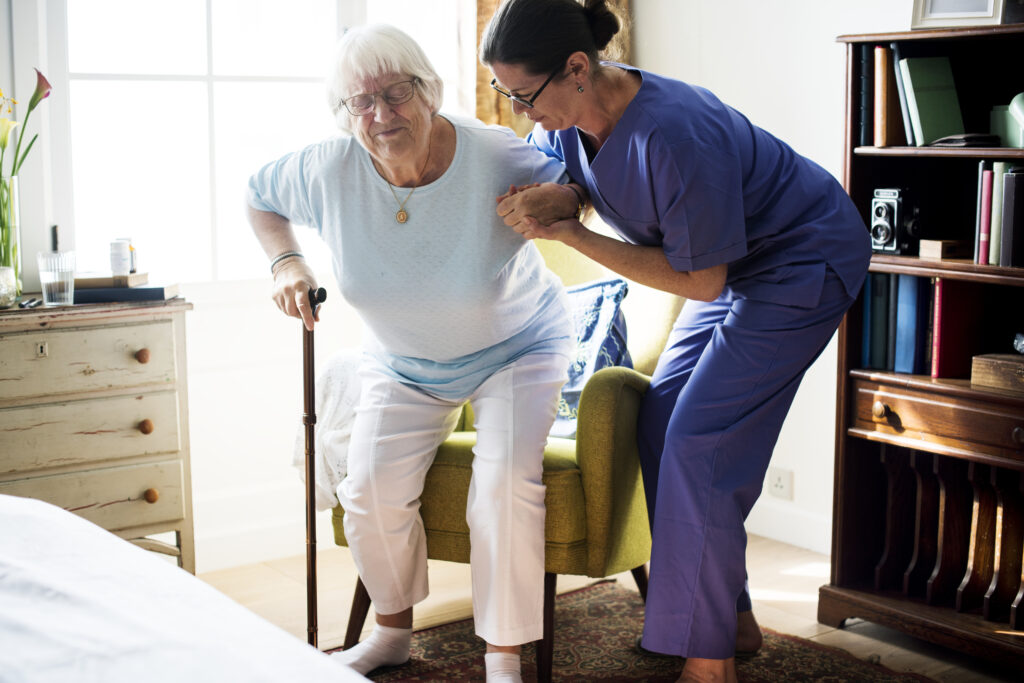Chicago Nursing Home Abuse Attorneys
If your loved one suffered at the hands of caregivers in a long-term care facility in Illinois, the nursing home abuse attorneys at Lloyd Miller Law can help.
With over 75 years of combined legal experience handling elder abuse cases in Chicago, our nursing home abuse & neglect lawyers will ensure that nurses, staff members, and owners, and managers are held accountable for the injuries their negligence caused.
- Award-Winning Chicago Attorneys
- More Than $400 Million Recovered
- Other Lawyers Turn to Us to Get Results
Let our nursing home abuse lawyers be your loved one’s voice. Call Lloyd Miller Law for a free consultation.
Call: 773-838-8100
Table of Contents

Case Results: Our Clients Win More
Negligence and Abuse Run Rampant in Illinois Nursing Homes
It is common for Illinois residents to read about nursing home abuse and neglect cases in the news. Thousands of innocent people are neglected or abused in Illinois nursing homes every year. Although maltreatment in long-term care facilities is a well-known problem throughout the state, nursing home statistics and the cases we read about in the news only tell part of the story. Like other crimes, nursing home abuse cases are not always reported. And some of the worst cases of neglect and abuse in long-term care facilities involve victims who suffer in silence. In many cases, elderly victims are unwilling or unable to report their tragic experiences.
At Lloyd Miller Law, our nursing home abuse and neglect lawyers want to help put an end to the suffering that continues to happen in long-term care facilities in Illinois. We want to make sure that wrongdoers are held accountable for the pain they have caused. Our elder abuse attorneys want to be your loved one’s voice.
How to Check for Illinois Nursing Home Violations
Various tools are available to help families check for nursing home violations, identify facilities with ongoing abuse and neglect issues, and select the best residential care provider for their loved ones. Our nursing home abuse attorneys recommend that you use the following tools to help ensure your loved one’s safety.
- The Illinois Department of Public Health (IDHP) issues quarterly reports about the nursing home facilities that have been determined to be in violation of the Nursing Home Care Act. Their database provides information about the types of violations, links to investigation reports, and the fines imposed. The list of facilities is in alphabetical order. For Quarter 1 of 2024, the list included nursing homes in Danville, Springfield, Des Plaines, Chicago, Naperville, Orland Park, Peoria, Skokie, and numerous other locations throughout Chicagoland.
- Medicare.gov offers a searchable database of nursing home facilities through their Care Compare tool. You can search by location, and filter your search by star ratings, the number of certified beds, and other factors. If there is a particular nursing home that you’re interested in, you can also search by the name of the facility. A detailed report offers information about inspections, staffing, quality measures, and more.
Who Can Be Held Liable for Nursing Home Injuries?
If you or your loved one suffered injuries caused by nursing home abuse or neglect, you may be able to file a personal injury lawsuit to hold the responsible parties accountable for their actions. Determining who to sue in a nursing home abuse case can be tricky, however, because multiple parties may hold varying degrees of liability. The defendants in your case might include:
- The nursing home facility
- Nurses and other medical professionals
- Administrators
- A staffing agency
Why File a Lawsuit for Nursing Home Abuse?
The true cost of neglect and abuse for a nursing home resident is substantial. Taking legal action against the medical professional and/or facility that caused you or your loved one harm brings numerous benefits.
- First, a lawsuit helps ensure that the wrongdoer is held accountable for the behavior.
- Second, taking legal action sends a message to other healthcare professionals and nursing homes that abuse and neglect will not be tolerated.
- Third, a successful lawsuit provides the victim and his or her family with compensation for medical bills, pain and suffering, and other losses sustained because of the abuse or neglect.
Who Can File a Lawsuit Against a Nursing Home in Illinois?
In Illinois, several parties may have the right to file a lawsuit against a nursing home, depending on the circumstances. Here’s an overview of who can typically file such a lawsuit:
- The resident: If the nursing home resident is mentally competent and able to make decisions, they can file a lawsuit on their own behalf.
- Legal guardian: If the resident has been declared legally incompetent, their court-appointed guardian can file a lawsuit on their behalf.
- Power of Attorney: Someone with power of attorney for the resident may have the authority to file a lawsuit, depending on the scope of their powers.
- Family members: In some cases, close family members such as spouses, children, or siblings may be able to file a lawsuit, especially if the resident has passed away or is incapacitated.
- Estate representative: If the resident has died, the executor or administrator of their estate can file a lawsuit on behalf of the deceased.
- Illinois Department of Public Health: In certain cases of widespread abuse or neglect, state agencies may take legal action against nursing homes.
The specific circumstances of the case, the nature of the complaint, and the resident’s condition will determine who has the legal standing to file a lawsuit.
If you’re considering filing a lawsuit against a nursing home in Illinois, consult with our nursing home abuse attorneys in Chicago. We will provide guidance on who has the legal right to file in your specific situation and help you navigate the complexities of the legal process.
Call Lloyd Miller Law for a free consultation. 773-838-8100
Types of Nursing Home Abuse and Negligence Occurring in Chicago
Nursing home abuse and negligence exist in many forms. While some symptoms of maltreatment are obvious, other signs of elder abuse may not be as readily apparent. The most common types of negligence our injury lawyers see include:
Physical Abuse by Caregivers
Physical abuse like pushing, hitting, pinching, grabbing, or using excessive force can lead to permanent or disabling physical injuries and emotional trauma. In extreme cases, physical abuse against nursing home residents can lead to wrongful death. Abuse by nursing home staff members often goes unreported by victims due to fear of retribution. Over 50% of nursing home staff members who were recently surveyed admitted to engaging in elder abuse.
Resident-on-Resident Abuse
In addition to physical violence between nursing home residents, other types of resident-on-resident abuse include bullying, name-calling, destruction of personal belongings, privacy violations, and sexual assault. Nursing homes that were aware, or should have been aware, that abuse was occurring between residents and failed to report it or take steps to stop the behaviors are guilty of negligence.
Psychological Abuse
Almost 1 out of 3 nursing home staff members who were surveyed admitted to verbally or emotionally abusing residents. Psychological abuse can take the form of verbal abuse, threats, intimidation, isolation, withholding medications, food and drinks, or personal belongings, and even humiliation by posting photos or videos on social media. Victims who have been psychologically abused often show signs of withdrawal, depression, or anger.
Gross Neglect
Staffing shortages are a leading cause of neglect in nursing homes in Chicago. When nursing homes and caregivers fail to administer medications, assist residents with mobility, eating, drinking, or daily hygiene, or they inadequately monitor people who are at risk of falling or wandering, they can be held liable for injuries.
Sexual Abuse
Any form of unwanted sexual contact with a nursing home resident is abuse. Nursing home residents who are 79 or older, female, and/or suffer from disabilities, mental illness, or dementia are at the highest risk of becoming sexually abused in long-term care facilities.
Financial Exploitation
When a staff member misuses a nursing home resident’s assets, coerces a resident into giving money or personal items away, or commits identity theft, the nursing home facility and the wrongdoer can be held accountable.
Signs of Nursing Home Abuse or Neglect
- Unexplained cuts, bruises, or broken bones
- Soiled clothing or bedding
- Poor personal hygiene
- Malnutrition or dehydration
- Bedsores
- Depression or mood swings

“Very friendly people and very persistent to stick with my case even through a pandemic, I definitely will recommend them”
FAQs About Nursing Home Abuse in Illinois
What compensation is available in a nursing home abuse or neglect case?
Victims of nursing home abuse may be entitled to different types of compensation for:
- The costs the resident paid to stay at the nursing home
- Medical expenses related to the abuse or neglect
- Pain and emotional trauma
- Punitive damages
How long do I have to file a lawsuit for nursing home negligence in Illinois?
In most cases, nursing home abuse and neglect lawsuits must be filed within two years or when the incident occurred. In cases involving breach of contract in Illinois, victims have up to 10 years to file a lawsuit.
What do I do if I suspect my loved one is suffering from nursing home abuse or neglect?
If you suspect your loved one is suffering from abuse or neglect in a nursing home in Illinois:
- Speak with your loved one about your concerns in private, if possible.
- Document injuries or signs of neglect.
- Report the abuse or neglect to the authorities.
- If physical or sexual abuse is evident, contact the police immediately.
- Speak with a nursing home abuse attorney about filing an injury claim.
Where do I report nursing home abuse in Illinois?
In Illinois, nursing home abuse can be reported to several agencies:
- Illinois Department of Public Health (IDPH)
You can file a complaint with IDPH, which regulates nursing homes and investigates abuse allegations. To report, call their Nursing Home Hotline at 1-800-252-4343 or file a complaint online at the IDPH website.
- Illinois Long-Term Care Ombudsman Program
This program advocates for residents of nursing homes and can help with abuse complaints. Call their statewide helpline at 1-800-252-8966.
- Adult Protective Services (APS)
If the abuse involves a vulnerable adult, you can contact APS by calling 1-866-800-1409 or visiting their website.
For emergencies or immediate danger, always call 911.
Contact Our Chicago Nursing Home Abuse Attorneys
If you suspect that your loved one is a victim of nursing home abuse or neglect in Illinois, contact our Chicago law firm right away. Our nursing home abuse attorneys offer free, no-obligation consultations to evaluate your case. We’ll help you put a stop to the mistreatment of your loved one, and we won’t charge you any fees unless we win compensation on your behalf.
